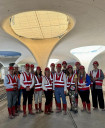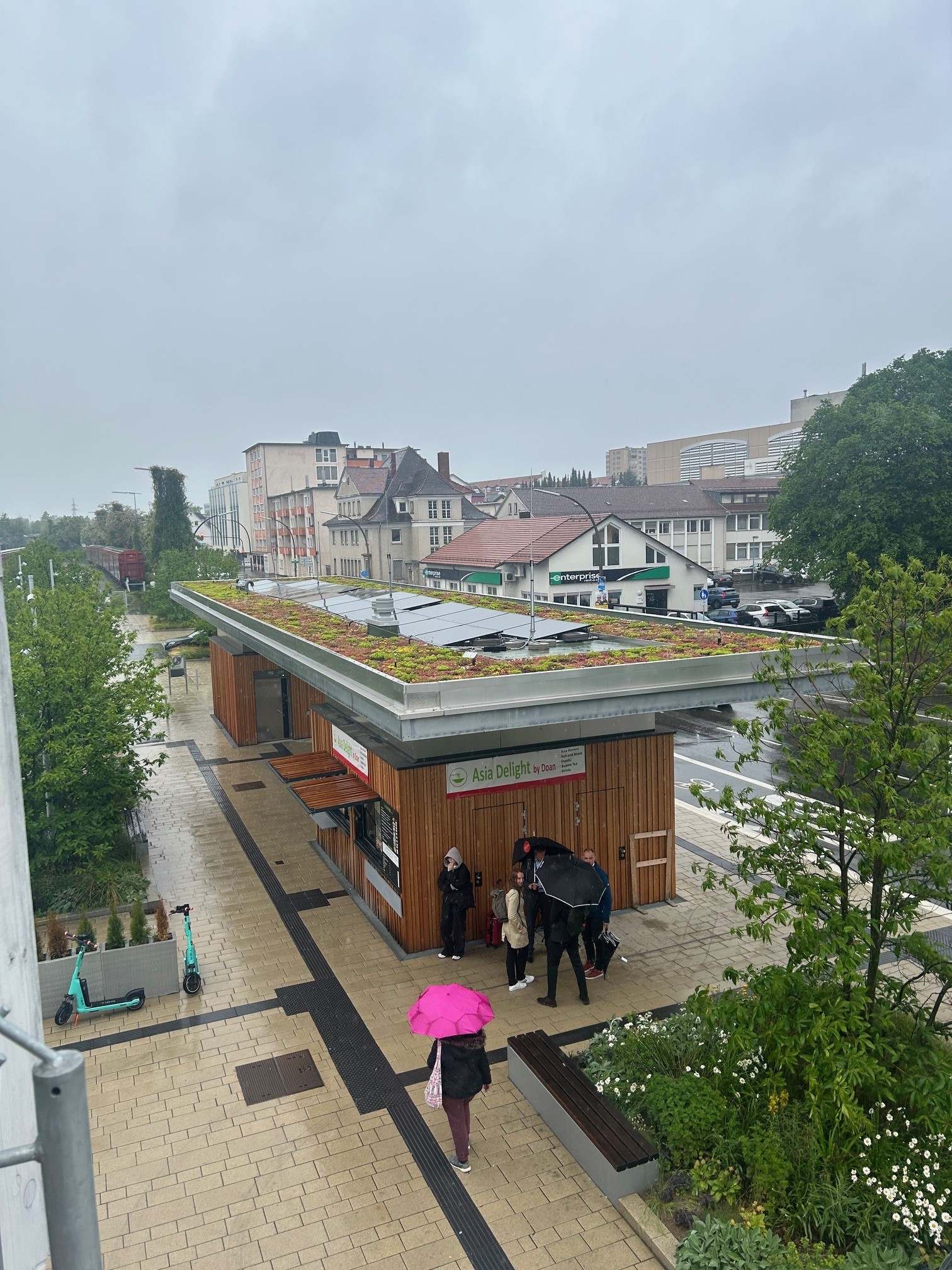Resistance against smart cities is growing. Technologists who claim that cities in the future will deploy up to 2 billions sensors ignore that they contribute to the big brother experience . On the other hand, the recent edition of the Smart City Magazine gives ample examples how sensors can improve liveability. The Nijmegen example in particular is a must read, because the city deployed sensors together with citizens and succeeded in lowering the costs significantly (in Dutch)
Want to receive updates like this in your inbox?
Get notified about new updates, opportunities or events that match your interests.
Maybe you will also like these updates
My highlights from the exchange between the Province of North-Holland and Baden-Württemberg

On May 17 and 18, I had the honour to join regional minister Olthoff from the Province of North Holland on a mission to Stuttgart, Baden-Württemberg. We went there to exchange experiences and learn from each other especially in the field of smart mobility.
After a nice train ride of no longer than 6 hours, we arrived in Stuttgart. We started our trip with a visit to ArenA2036 and Plug and Play Techcenter. A state-of-the-art research campus connected to a startup accelerator. Sascha Karimpour, director of Plug and Play, enthusiastically introduced us to their startup accelerator. He told us how they bring research and industries together and find efficient ways to collaborate with startups.
“To keep it exciting we constantly have to change. The major challenge now is not only matching start-ups and companies but also putting a lot of effort in stakeholder management, because if you don’t do that it will fall apart” - Sascha Karimpour.
In the research lab of ArenA2036 we saw amazing technologies come to life. From smart floors to highly advanced robotica and intralogistics; optimizing human and robot logistics in production. Peter Froeschle, CEO of ArenA2036, showed us around.
“Bringing all disciplines together increases creativity. But building an innovation platform is much more than just providing the facility. You need to keep the fire burning.” – Peter Froeschle.
In the afternoon, we had an official exchange with Verband Region Stuttgart. Here we learned that the Province of North Holland and Baden- Württemberg face a lot of the same mobility challenges. Similar to the Province of North-Holland, the interaction between urban and rural areas is important in Baden- Württemberg. We visited their innovative mobility hub concept. With standard services like the bus, taxi, P&R, bike & ride, but also an Information Terminal and 24/7 Info hotline, bike service station and kiosk.

Afterwards, we visited the construction site of Stuttgart 21, a large fully underground train station and 60km tunnel - a highlight of the trip! The impressive station is designed by the architect Ingenhoven. The prestigious design is characterised by its huge concrete pillars and a glass roofs providing light. A very controversial project which in the end was voted for in a referendum with 57% of the votes. By building the train station underground, public space in the city center will be freed up for housing. Take a look yourself at this unique project.
The next morning, we continued the knowledge exchange with the ministry of Transport of Baden- Württemberg. We learned a lot from their ambitious plans. State secretary of Transport Zimmer presented us the ambitious plans of Baden- Württemberg. Their goal is to be climate neutral in 2040, which is 10 years earlier than the EU ambitions. They really aim to be the frontrunner. Inspiring financing tools like a Mobility Pass and a Mobility Guarantee were presented. As well as diverse modalities of Mobility on Demand in more remote locations.
All in all, it was a very inspiring trip! We learned a lot and strengthened the ties with the Baden- Württemberg region.
(GESLOTEN) Vacature: Communicatie- en Programmamedewerker Amsterdam Smart City (32 uur)

Ben jij thuis in de wereld van communicatie en event management? En gaat jouw hart sneller kloppen van duurzaamheid, stedelijke innovatie en netwerken?
Kom dan als junior Communicatie- en Programmamedewerker het team van Amsterdam Smart City versterken!
Wie zijn wij?
Amsterdam Smart City is een onafhankelijk innovatieplatform, dat innovatieve bedrijven, kennisinstellingen, maatschappelijke organisaties, overheden en proactieve bewoners samenbrengt en de stad van de toekomst vormgeeft. Amsterdam Smart City maakt als programma deel uit van Amsterdam Economic Board.
Samen met 29 partners werken wij aan een betere, duurzame en toekomstbestendige wereld. Daarnaast brengen we een internationale community samen van meer dan 9.000 innovatieprofessionals, studenten en geïnteresseerden. Zij ontmoeten elkaar rond verschillende thema’s en helpen elkaar verder. Door al deze partijen te verbinden, en met hen het gesprek te voeren over de grote uitdagingen in onze regio, komen we tot nieuwe verhalen en innovatieve oplossingen die bijdragen aan betere straten, buurten en steden. We richten ons met name op vier transitiethema’s: Mobiliteit, Digitaal, Energie en Circulair.
Hier staan wij voor
Iedereen is anders, en juist met verschillende mensen werken wij nog beter aan de metropool van morgen. We zijn nieuwsgierig naar jouw talenten, wat jou bijzonder maakt. We horen graag jouw ideeën en perspectieven. Dat helpt ons om samen nog meer impact te maken.
Wat ga je doen?
Je beheert onze online kanalen en je organiseert samen met het team evenementen. Met verslaglegging, enthousiasme en het maken van nieuwe connecties binnen ons netwerk versterk je ons regionale en internationale netwerk! Je werkt nauw samen met- en ondersteunt het hele Amsterdam Smart City team en de programmadirecteur. Dit zijn je taken:
Beheer en schrijven van onze wekelijkse nieuwsbrief en LinkedIn content. Je neemt initiatieven om de interactie en het bereik te vergroten.
Je houdt toezicht op de berichten op het online platform en je stimuleert leden om content te plaatsen
Beheer info mailbox (inkomende verzoeken, vragen etc.)
Ondersteuning inhoudelijke verslaglegging netwerkevenementen en werksessies, en het opmaken van presentaties
Praktische ondersteuning bij evenementen (locaties, uitnodigingen, communicatie)
Ondersteuning bij het organiseren van werksessies en het bouwen van coalities
Wie ben jij?
Je hebt wo/hbo werk- en denkniveau, een opleiding in de richting van communicatie (of vergelijkbaar);
Je hebt 1-2 jaar werkervaring en ervaring op het gebied van online communicatie/community en/of event management
Je beheerst de Nederlandse en Engelse taal uitstekend in woord én geschrift
Je hebt affiniteit met duurzaamheid, innovatie en stedelijke ontwikkelingen en je vindt het belangrijk om met je werk maatschappelijke impact te maken.
Je beschikt over voldoende algemene kennis over bovenstaande en je kan hier helder over schrijven.
Je bent proactief en nieuwsgierig
Je bent sociaal, enthousiast en houdt van netwerken en verbinden.
Wat bieden wij?
Wij bieden je een fijne werkplek op het Marineterrein in Amsterdam, met een informele en collegiale sfeer. We zijn een klein team dat nauw met elkaar en onze partners samenwerkt.
Je wordt deel van een enorm divers en dynamisch netwerk van koplopers en pioniers in stedelijke innovatie van toonaangevende organisaties in de Metropool Amsterdam. Er is veel ruimte om te leren van collega’s en specialisten uit het netwerk en je te verdiepen in de thema’s die jou interesseren. Samen leren we door te doen!
Daarnaast bieden wij:
Een functie voor 32 uur per week;
Een half-jaar-contract met uitzicht op verlenging;
Salarisindicatie €3.300 - €3.500 bruto per maand (o.b.v. 40 uur), aangevuld met vakantie- en eindejaarstoeslag.
Interesse gewekt?
Ben je enthousiast? Dan horen we graag van je! Stuur je CV en een korte motivatie uiterlijk 4 april per mail aan solliciteren@amecboard.com. De eerste gesprekken vinden plaats op 10 en 12 april. Vervolggesprekken zijn in de ochtend van 19 april. Een schrijfopdracht maakt deel uit van de procedure. Neem voor meer informatie over de functie contact op met Pelle Menke. Hopelijk spreken we elkaar snel!
Recap of Demoday #22

On Thursday December 14th, Amsterdam Smart City partners concluded 2023 with an afternoon full of inspiration, exchange and connections at our 22nd Demoday! Our partner Deloitte welcomed our network in The Garage, where their ‘Deloitte Studios’ department is located. In this article, we’ll give you a quick overview of the Knowledge Session, Work Sessions and Pitches. Interesting in learning more? Read the full reports by our Programme Managers Noor, Pelle and Sophie (linked below).
About our Demodays
The Demodays are one of the tools we use to stimulate innovation and encourage connection between our partners and community. The purpose of the Demodays is to present the progress of various innovation projects, ask for help, share dilemmas and involve more partners to take these projects to the next level. More information about the Demodays can be found here.
Knowledge Session: Change in the here and now, with Theory U
To kick-off our final Demoday of 2023, our brand-new partner Hieroo led an inspiring knowledge session about the change method they use for social innovation in the city: Theory U. Dorien Schneider and Maartje Krijnen taught us more about this methodology and how it can help us solve complex problems by shifting from ego to eco-thinking. Read the full report here.
Work sessions
After the plenary Knowledge Session we split up in different worksessions, each exploring regional innovation challenges. As always, we had set up the sessions’ topics and moderation in collaboration with our partners.
Mobility | Decision-making along the principles of Inclusive Prosperity – Jurhan Kwee (Municipality of Amsterdam)
In The Netherlands, the concept of ‘Inclusive Prosperity’ is on the rise. Policy makers are busy defining this concept, figuring out how to put this concept into practice and what it means for their decision-making process. Together with his colleagues at the Municipality of Amsterdam, Yurhan Kwee hosts sessions on decision-making along the principles of Inclusive Prosperity. With the input he gathers, he hopes to make the decisions needed for our Inclusive Prosperity ambitions more understandable and transparent, both for Amsterdam’s administrators and councillors as well as its citizens. Read Pelle’s recap article here.
Digital | Data Commons Collective: Using data for a liveable city – Lia Hsu (Amsterdam Economic Board) and Simone van der Burg (Waag)
In the big tech-dominated era, data has been commercially exploited for so long that it is now hard to imagine that data sharing might also benefit the community. Yet that is what a collective of businesses, governments, social institutions and residents in Amsterdam aim to do. Sharing more data to better care for the city. On behalf of the Data Commons Collective, Lia Hsu (Strategic Advisor at Amsterdam Economic Board) asked the Amsterdam Smart City network for input and feedback on their Data Commons initiative. Read Sophie's recap article here.
Energy | How can we continue to facilitate the homeowner in driving the energy transition? | Wouter van Rooijen (Alliander)
Wouter van Rooijen (Alliander) discussed the challenges related to grid congestion. From 2030 onwards, it is expected that a significant portion of the low-voltage network will experience both over- and under-voltage. While the network will be reinforced as quickly as possible, the lack of labour capacity is also prompting the consideration of alternative solutions.
The solution that emerged from Wouter's co-creation process was WijkWise. In this work session, Wouter aimed to validate the WijkWise concept and find parties that could contribute to its development and market implementation. Dave van Loon from Kennisland moderated the session. Read Noor’s recap article here.
Circular | Navigating eco-emotions: The impact of working in sustainability on your mental wellbeing| Marian Zandbergen (Hogeschool van Amsterdam)
This work session, led by Marian Zandbergen (CIRCOLLAB, HvA) and moderated by Mareille de Bloois (Royal HaskoningDHV), explored the challenges and opportunities associated with eco-emotions, both personally and within organizations. The key question addressed was: How can individuals and organisations constructively manage eco-emotions, and what implications does this have for organisations? Read Noor’s recap article here.
Pitches
To end this festive afternoon and the year 2023 as a whole, we invited project owners and -members to present their progress and next steps on topics brought in during our events and deep-dives throughout 2023. The following projects were presented. You can read more about these topics on their dedicated articles and project pages, linked below.
Local Energy Systems: Where we started, what we have achieved, and what are the next steps – Omar Shafqat (University of Applied Sciences Amsterdam)
Connecting the resource- and energy transition – Edwin Oskam (MRA)
ChatGPT and the government: Possibilities and impact on our work – Jeroen Silvis (Province of North Holland)
Floating urban districts: Future-proof living in the Metropolitan Region – Joke Dufourmont (AMS Institute)
Mobility Justice: Raising the topic of Mobility Poverty and the working group’s progress – Bas Gerbrandy (Province of North Holland)
Our next Demoday will take place in April. Do you have an inspiring story or project you want to pitch to the Amsterdam Smart City network? Let us know via sophie@amsterdamsmartcity.com


I forgot the link to the article in De Groene Amsterdammer (this article is behind a pay-wall, albeit not very expensive.
https://blendle.com/i/de-groene-amsterdammer/de-muren-hebben-sensoren/bnl-groeneamsterdammer-20171207-1_18_1?sharer=eyJ2ZXJzaW9uIjoiMSIsInVpZCI6Imhlcm1hbnZhbmRlbmJvc2NoMSIsIml0ZW1faWQiOiJibmwtZ3JvZW5lYW1zdGVyZGFtbWVyLTIwMTcxMjA3LTFfMThfMSJ9
Here is a link to a short article in English
http://smartcityhub.com/collaborative-city/privacy-smart-cities/
Possibly, you are also interested in my recently published short essay 'smart city, beyond the technology push'
http://smartcityhub.com/technology-innnovation/smart-beyond-technology-push/
This article from De groene Amsterdammer is summarising the current debate about sensors in the relatively small circle of people that participates in the discussion with regards to smart cities.
I will refer at an English article in case you do not have Dutch language proficiency.
Dear Herman, how is this resistance measured or what source are you referring to ?,
typically people give up their anonymity in return if free-Wi-Fi etc.
Curious to learn more